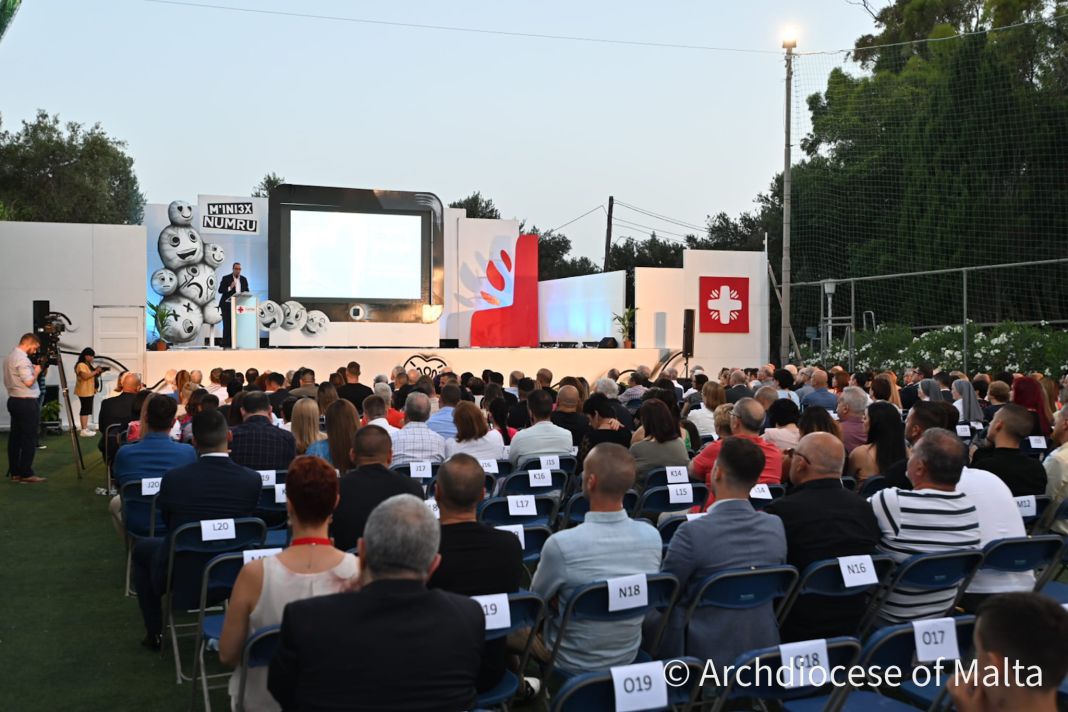
Thirteen people have successfully completed a residential drug rehabilitation programme run by Caritas Malta, celebrating their progress in a graduation ceremony at the San Blas Therapeutic Community on Friday evening.
The ceremony was attended by President George Vella and his two direct predecessors, Marie-Louise Coleiro Preca and George Abela, Bishop Joseph Galea Curmi and the director of Caritas Malta from 1977 to 2014, Mgr Victor Grech.
The theme of the event was “m’inix numru” (I am not a number), and was chosen by the graduating residents themselves, as Caritas Malta director Anthony Gatt explained in his address for the occasion. Gatt noted that the San Blas residents had spoken of many instances in which they felt reduced to a number, stripped of dignity, with people judging them or failing to support them.
A year of records
As Gatt highlighted, the ceremony follows a year of records for Caritas Malta, though the foundation would have little reason to celebrate these records.
No less than 765 people sought Caritas Malta’s help to overcome drug addictions last year, of which no less than 50% – a proportion higher than ever recorded – seeking help for cocaine addiction. A further 21% sought treatment due to their heroin, and 17% over cannabis.
233 of these clients made use of one of Caritas Malta’s residential facilities last year, and Caritas’ assistance was also sought by 491 relatives of people struggling with drug addiction.
Drug rehabilitation is but one of the many services in the community offered by Caritas Malta, whose Counselling and Social Work Unit provided assistance last year to 575 people dealing with poverty, homelessness, mental health issues, usury, domestic violence and other personal struggles.
Caritas, Gatt said, was constantly evolving to respond to the “needs and challenges of today’s reality,” which included easy access to drugs, cocaine culture and cannabis culture, mental health concerns, a fast-rising cost of living and increasingly unaffordable housing.
But given the occasion, Gatt said that he wished to focus primarily on Malta’s drug culture, recounting this was a key concern for Caritas Malta’s clients and their families.
He said many lamented about the frequent use of cannabis in public – in spite of a continued legal prohibition of this use – and that cocaine could be found everywhere.
While he observed that the Authority for the Responsible Use of Cannabis – which is overseeing the management of Malta’s legalisation of cannabis – has emphasised that the “social clubs” that will sell cannabis to their members are bound not to promote their activities, h said that the promotion of cannabis was already happening through grow shops which can legally sell cannabis products as long as their THC levels do not exceed 0.02%.
“We have even seen advertising on bus stops, and schoolteachers feel they are waging a losing battle when children are well aware that they can legally smoke cannabis at 18,” he said. “And the difficulty of actually enforcing the prohibition of the use of cannabis in public is evident.”
Gatt recalled that a person who graduated from Caritas’ drug rehabilitation programme 7 years ago had told him that had cannabis been legal at the time, it was highly unlikely that he would have sought treatment.
“We recognise that a large percentage of those who use cannabis do not develop a dependence, but facilitating recreative use will see a higher proportion of people pay the high price of drug dependence,” he said.
“Our misfortune is that we will need to work harder to solve the problem we have created for ourselves.”
‘Always remember what you went through to reach this stage’ – President
In his own address, President George Vella urged the graduates to never give up and to always remember what they had gone through to reach the stage.
“You are fourteen different stories and each one epitomises success, courage and hope,” he said, describing the resilience they had shown and the changes they had made over a year and a half as truly admirable.
“Everyone’s life is full of challenges and the use of substances that lead to addictions is an example of how some people think they will find solace,” he observed.
In the face of this reality, he urged the public to show empathy and compassion when they meet people struggling with addiction and to avoid judgment and contempt.
“When we remove the stigma that unfortunately still remains, we would be ensuring that everyone battling addiction feels appreciated and understood, not despised or insulted,” he said.
Vella also referred to ARUC, insisting that it should not be an authority in name only, but one which should also be empowered to help change or update Malta’s drug laws as required.
He also urged the authorities to strengthen their efforts in favour of social justice and to prevent addictions.
“This is a fight against drug addiction, not a fight against victims. These are our brothers and sisters who need all our help, sympathy and love,” he said.
Source: Newsbook.com.mt





